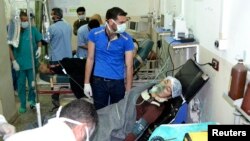BEIJING —
China's Foreign Ministry said on Wednesday that it was investigating reports that a chlorine canister bearing the name of the country's biggest arms maker was shown in footage believed to document a gas attack in Syria this month.
Attacks this month in several areas in Syria share characteristics that have led analysts to believe that there is a coordinated chlorine bomb campaign, with growing evidence that it is the government side dropping the weapons.
In the rebel-held village of Kfar Zeita in the central province of Hama, 125 miles (200 km) north of Damascus, opposition activists uploaded video of people choking and being fed oxygen following what they said were bombs dropped from helicopters on April 11 and 12.
Further footage showed a partially exploded canister with the chemical symbol for chlorine along with the name of Chinese arms manufacturer Norinco.
Reuters could not verify the authenticity of the videos and Norinco, also known as China North Industries Group Corporation, has not responded to requests from Reuters for comment.
“After seeing this report, we paid great attention and immediately sought to understand [the situation] from relevant departments. We will clarify this issue in a timely manner,” Foreign Ministry spokesman Qin Gang told a regular press briefing.
“We oppose the production and use of chemical weapons. On this, we are conscientious and responsible. Domestically, we have relevant laws and rules and a supervision system.”
In a statement later emailed to Reuters, the ministry said China “scrupulously abides by its non-proliferation obligations” and strictly controls exports of dual-use items, including sensitive chemicals.
“Chlorine is a raw material that has wide industrial uses, and it is not on any nation's or organization's list of controlled items,” it said.
“China hopes that relevant media can objectively and fairly report this, to avoid causing misunderstanding.”
Syria has vowed to hand over or destroy its entire chemical weapons arsenal by the end of this week, but still has roughly 14 percent of the chemicals it declared to the Organization for the Prohibition of Chemical Weapons (OPCW).
In addition, the alleged battlefield use of chlorine gas, never included on the list submitted to the OPCW, has led some countries to consider requesting an investigation, possibly through the United Nations.
Disposing of Syria's chemical weapons
Syrian President Bashar al-Assad agreed with the United States and Russia to dispose of his chemical weapons - an arsenal that Damascus had never previously formally acknowledged - after hundreds of people were killed in a sarin gas attack on the outskirts of the capital last August.
Washington and its Western allies said it was Assad's forces who unleashed the nerve agent, in the world's worst chemical attack in a quarter-century. The government blamed the rebel side in Syria's civil war, now in its fourth year.
China and its ally Russia have vetoed Western efforts to impose U.N. penalties on Assad. But China, been keen to show it is not taking sides, has urged the government to talk to the opposition and take steps to meet demands for political change.
Attacks this month in several areas in Syria share characteristics that have led analysts to believe that there is a coordinated chlorine bomb campaign, with growing evidence that it is the government side dropping the weapons.
In the rebel-held village of Kfar Zeita in the central province of Hama, 125 miles (200 km) north of Damascus, opposition activists uploaded video of people choking and being fed oxygen following what they said were bombs dropped from helicopters on April 11 and 12.
Further footage showed a partially exploded canister with the chemical symbol for chlorine along with the name of Chinese arms manufacturer Norinco.
Reuters could not verify the authenticity of the videos and Norinco, also known as China North Industries Group Corporation, has not responded to requests from Reuters for comment.
“After seeing this report, we paid great attention and immediately sought to understand [the situation] from relevant departments. We will clarify this issue in a timely manner,” Foreign Ministry spokesman Qin Gang told a regular press briefing.
“We oppose the production and use of chemical weapons. On this, we are conscientious and responsible. Domestically, we have relevant laws and rules and a supervision system.”
In a statement later emailed to Reuters, the ministry said China “scrupulously abides by its non-proliferation obligations” and strictly controls exports of dual-use items, including sensitive chemicals.
“Chlorine is a raw material that has wide industrial uses, and it is not on any nation's or organization's list of controlled items,” it said.
“China hopes that relevant media can objectively and fairly report this, to avoid causing misunderstanding.”
Syria has vowed to hand over or destroy its entire chemical weapons arsenal by the end of this week, but still has roughly 14 percent of the chemicals it declared to the Organization for the Prohibition of Chemical Weapons (OPCW).
In addition, the alleged battlefield use of chlorine gas, never included on the list submitted to the OPCW, has led some countries to consider requesting an investigation, possibly through the United Nations.
Disposing of Syria's chemical weapons
Syrian President Bashar al-Assad agreed with the United States and Russia to dispose of his chemical weapons - an arsenal that Damascus had never previously formally acknowledged - after hundreds of people were killed in a sarin gas attack on the outskirts of the capital last August.
Washington and its Western allies said it was Assad's forces who unleashed the nerve agent, in the world's worst chemical attack in a quarter-century. The government blamed the rebel side in Syria's civil war, now in its fourth year.
China and its ally Russia have vetoed Western efforts to impose U.N. penalties on Assad. But China, been keen to show it is not taking sides, has urged the government to talk to the opposition and take steps to meet demands for political change.





